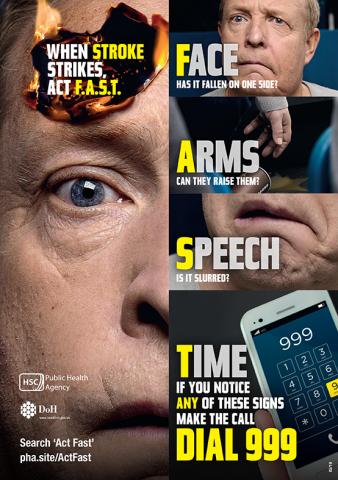FAST campaign re-launched – call 999 if you see any single one of the signs of stroke

Stroke is a common cause of death and disability in Northern Ireland. There are approximately 2,800 new strokes here every year and in 2017, 988 people died following a stroke. While the majority of strokes occur in people over the age of 65, it can strike at any age, with 25% occurring in people under the age of 65.
Stroke is the third most common cause of death and one of the main causes of adult onset disability in Northern Ireland, but early diagnosis improves the chances of a good recovery. The Public Health Agency (PHA) is re-running the FAST public information campaign to raise awareness of the main signs and symptoms of stroke and what to do if you think you or someone you know is having a stroke.
The FAST campaign highlights the key signs and symptoms of stroke in an easy to remember way and emphasises the need to call 999 immediately if you notice any single one of these signs:
Face - Has it fallen on one side?
Arms - Can they raise them?
Speech - Is it slurred?
Time - If you notice any of these signs make the call, Dial 999
Knowing the signs and symptoms and acting FAST can improve the chances of survival and reduce the level of disability that results from a stroke.
The faster you act the more of the person you can save.
Dr Brid Farrell, Consultant in Public Health Medicine at the PHA, said: “Stroke is a ‘brain attack’, which happens when the blood supply to part of the brain is cut off and brain cells are damaged or die. The sooner somebody who is having a stroke gets urgent medical attention, the better their chances of a good recovery.
“A stroke is a medical emergency and requires immediate medical attention, so recognising a stroke and calling 999 for an ambulance is crucial.”
Your chances of having a stroke reduce if you understand the risks and take action to prevent a stroke happening. You can reduce your risk of having a stroke by:
• knowing and managing your personal risk factors such as high blood pressure, diabetes, high blood cholesterol or an irregular heartbeat (eg atrial fibrillation).
• exercising regularly and maintaining a healthy weight;
• reducing alcohol consumption;
• stopping smoking.
If a person has stroke symptoms, when 999 is called, they will be brought by ambulance to the nearest acute stroke centre.
For further information visit:
